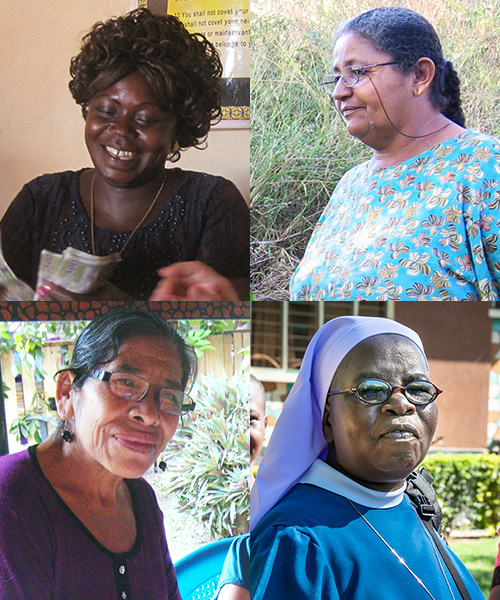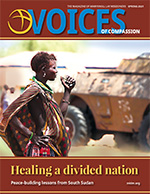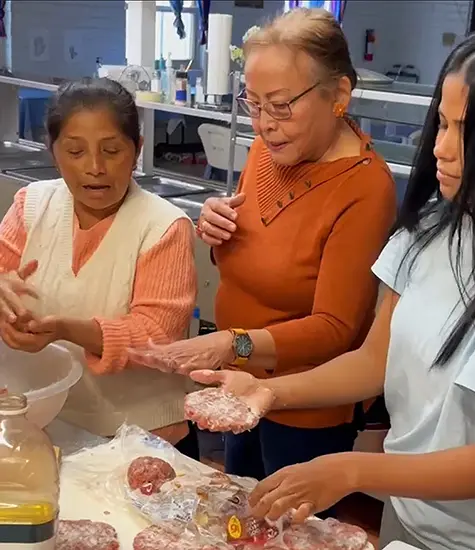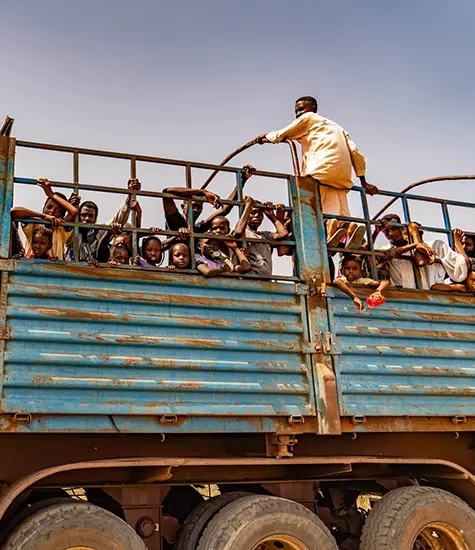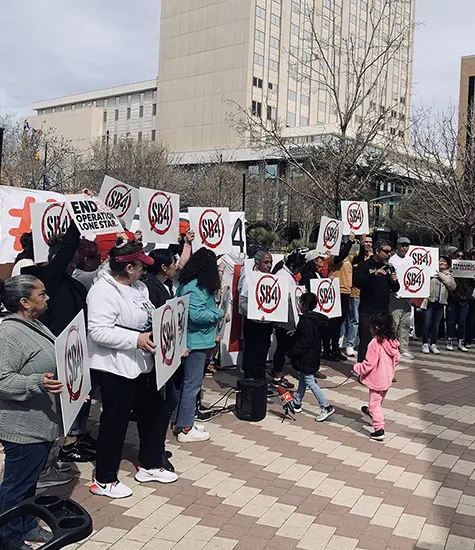Melissa Altman on Paula Perez
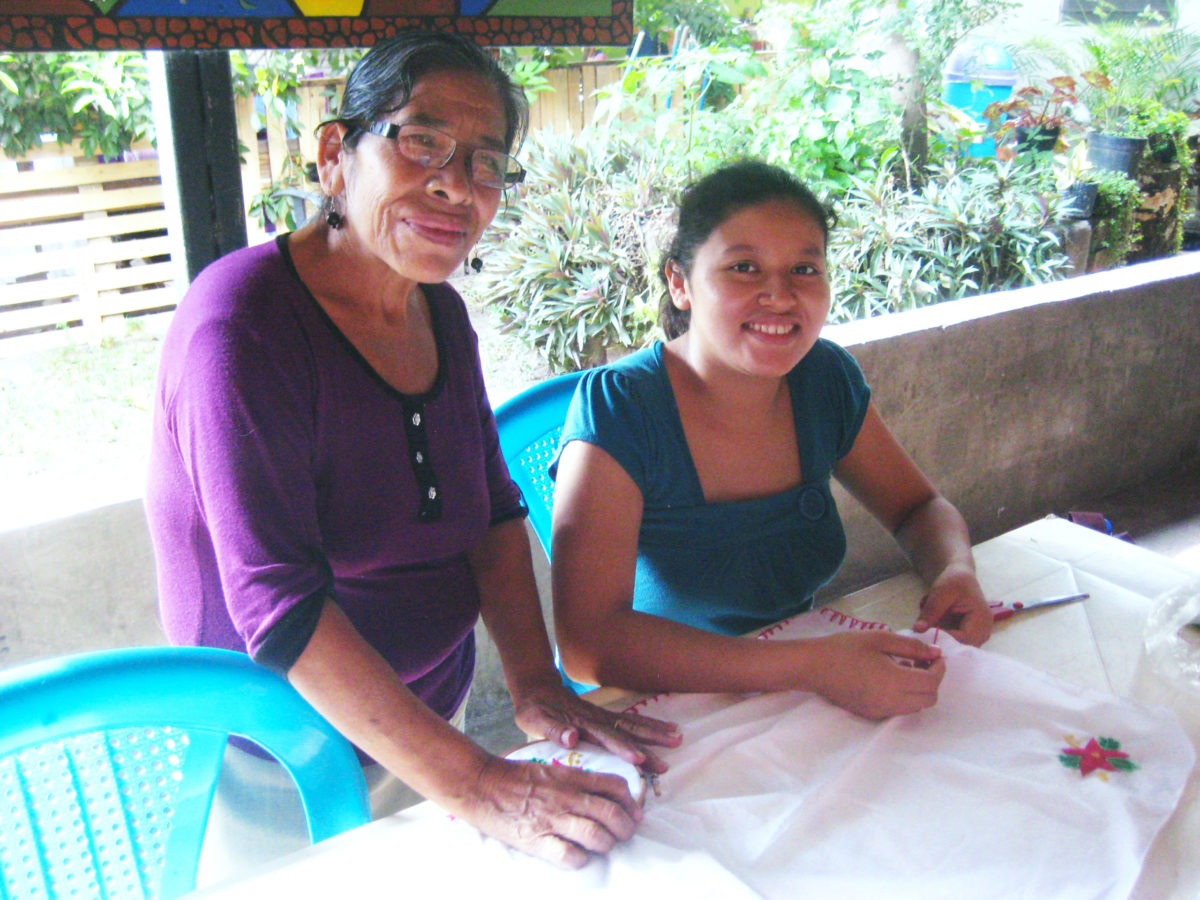
Paula Perez (left) teaching hand-embroidery to a young woman during a 2016 summer class in Zaragoza, El Salvador. Photo by Melissa Altman.
During the 1979-1992 civil war in El Salvador, Paula Perez, her sister Esmeralda, and their 10 siblings were living in their hometown of Monte San Juan. One night they were warned that the army was going to come and burn everything down. They fled and settled in Zaragoza.
Despite government intimidation, Paulita, as we called her, worked together with other community
leaders and became very active in her new parish’s social ministry. The parish was served by the Cleveland diocese mission team, and Paulita knew and worked with two of the four U.S. church women who were martyred in 1980 — Ursuline Sister Dorothy Kazel and lay missioner Jean Donovan.
In those years, Paulita helped take care of many children who lost their parents in the war.
I met Paulita when I started working in Zaragoza in 2016. She was one of 15 women who started an association called Mujer y Comunidad (Woman and Community). She knew how to hand-embroider, and one of the other women, María Julia, knew how to sew. The two of them taught other women, and that’s how our women’s cooperative, ACOMUJERZA, began.
The community and co-op were always first in Paulita’s mind. “We need to remember that this is for the co-op,” she would say, always focused on the common good and on bringing in and including others.
I remember the great way Paulita had of dealing with one woman who was always looking for an angle to make some personal profit. She would say, “That’s a great idea, but let’s think of it for the cooperative. Let’s put the community, the women, the children, the people at the center of what we’re doing.”
I always think of her when I’m in a meeting and someone is missing the point. How can I do this in a Paulita way, reminding this person of why we’re here and reorienting them toward the common good?
Paulita would never be the person to get up and give a speech, yet she lived a deep faith through her actions, whether it was taking care of the orphans during the war or teaching a mom how to sew. That was her spiritual way to walk.
Paulita was already ill when I met her, but she continued working full time. Unfortunately, her illness progressed and she eventually died two years ago. It was hard watching her decline and visiting her on her deathbed. She and her sister Esmeralda, who is also a pillar of our co-op, are an example of living through trauma, coming through to the other side and still working for solidarity.
Liz Mach on Sister Annunciata Chacha, IHSA
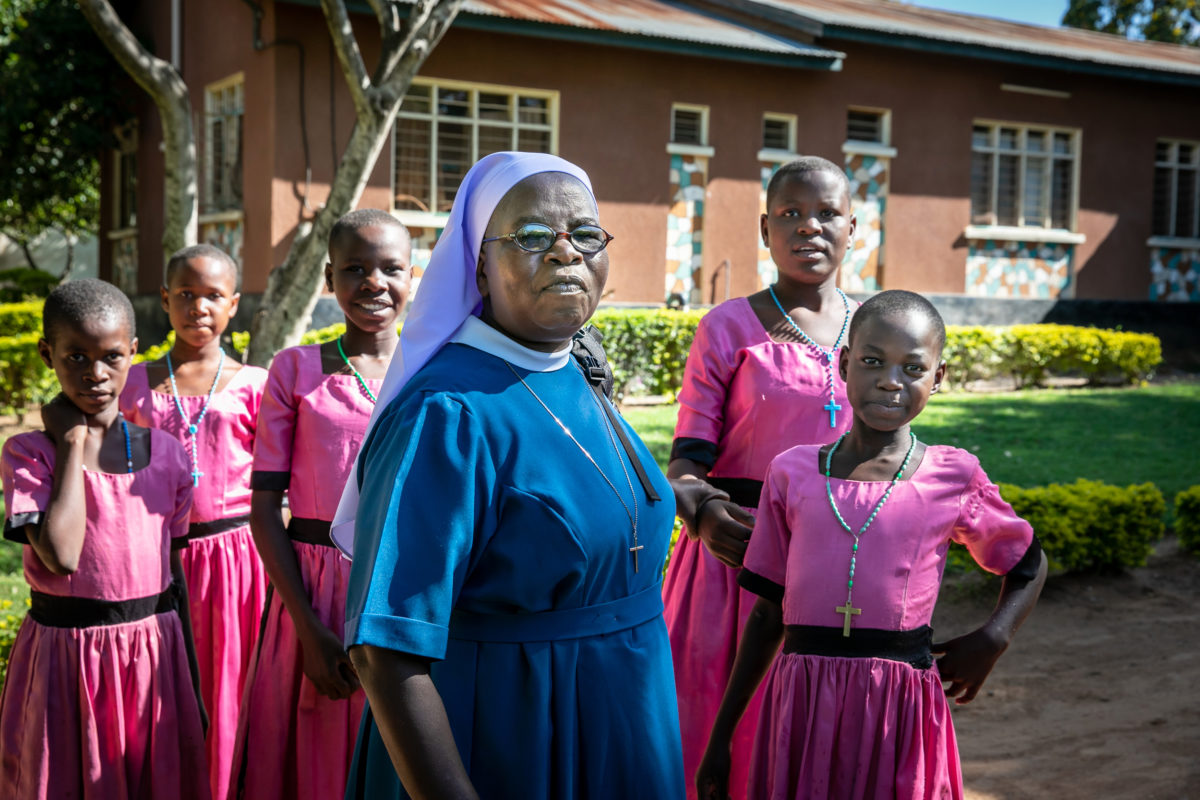
Sister Annunciata Chacha, IHSA, with girls from the Jipe Moyo shelter in Musoma, Tanzania. Photo by Jerry Fleury.
I met Sister Annunciata Chacha when I was working with the Musoma diocese and needed help with Jipe Moyo, a shelter that helps children, mostly girls, who have been orphaned or abandoned.
She had joined the Immaculate Heart Sisters of Africa, a Tanzanian order of women religious that was initially founded by Maryknoll. After working for some time on women’s issues, she was elected to her order’s council and moved to their motherhouse in Musoma. Because of her previous experience, we asked her to head Jipe Moyo.
Running Jipe Moyo is a big responsibility, and Sister Annunciata is very good at it, including at fundraising and finances. Unfortunately, as a result, she has had to deal with a lot of criticism from some of the priests in the diocese, who think women should not be handling money and make life tough for her. I admire how she stands up to that criticism and doesn’t let it distract her.
Sister Annunciata also prays with the kids and connects them with the wider world. After I moved back home to Minnesota last summer, one of my good friends here had to go on a ventilator and eventually died of COVID. I let Sister Annunciata and the girls know right away. The children were praying for Cindy, whom they knew because she had visited us in Musoma.
Many of the children at the shelter have experienced severe trauma — they may have been raped, escaped child marriages, or been beaten and kicked out of their homes for refusing to undergo female genital mutilation (FGM). Although illegal, the practice of FGM, sometimes called female circumcision, remains a common practice in this part of Tanzania, including in Sister Annunciata’s ethnic group. Luckily she and her sisters were spared because her father, a catechist, could not reconcile it with his Christian faith.
Having had these traumatic experiences, the children need someone like Sister Annunciata who has tremendous compassion and empathy. She spends a lot of time just being with the children in small groups. They might be cleaning, gardening, sewing or making rosaries. When you are doing these things together, you can start talking about issues in a non-threatening way. She does that so beautifully.
There were times, after hearing the story of a child who was raped, I went home and just cried my eyes out, but Sister Annunciata listens to those horrendous stories all the time. She told me, “I just take it to prayer and give it back to God because that is all you can do.”
Kathy Bond on Dona Neura
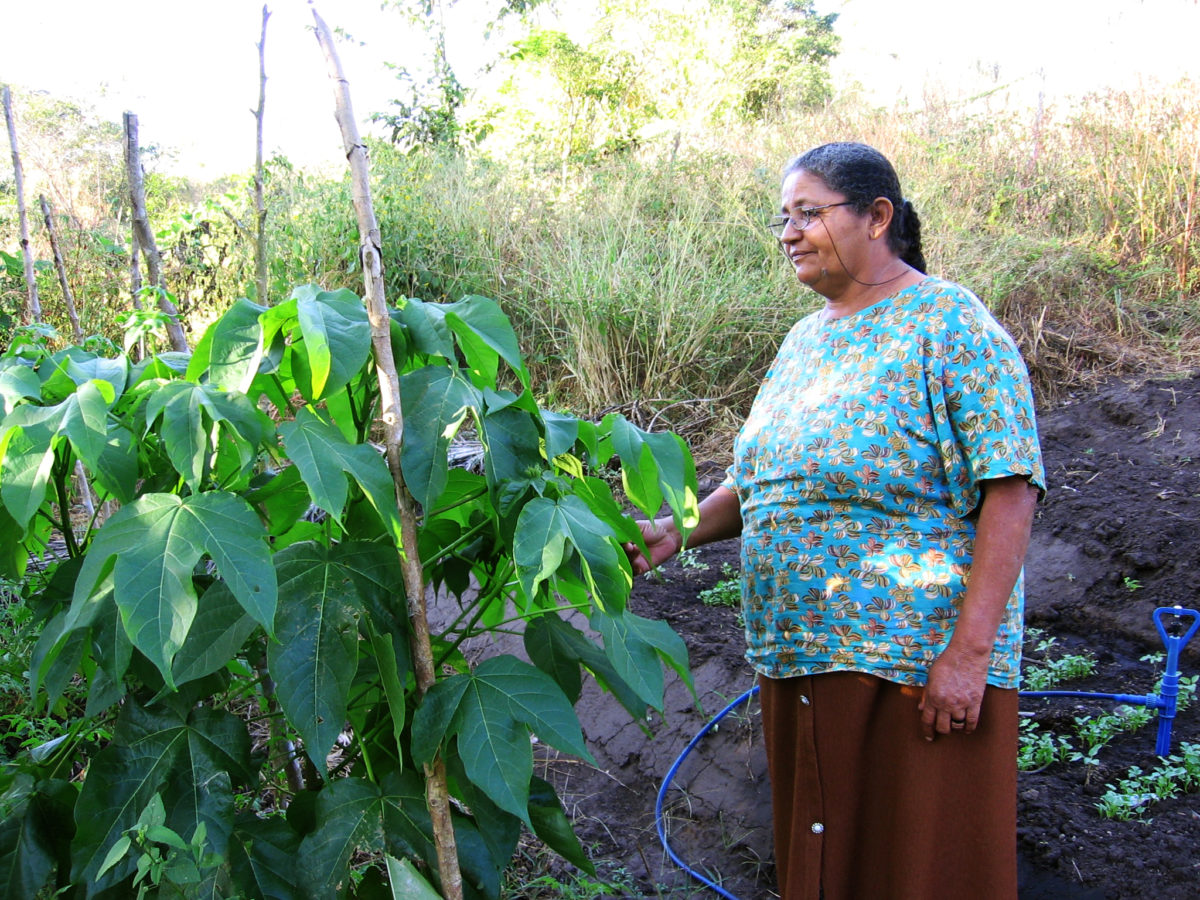
Dona Neuraci Cezario Pereira inspects her chaya (tree spinach) on her land in Cruz do Espírito Santo, Paraíba, Brazil. Photo by Kathy Bond (2006).
I met Dona Neuraci Cezario Pereira 23 years ago, during my early time in northeastern Brazil. I was working for the Brazilian Catholic Church’s Pastoral Land Commission, which advocates for rural people in situations of marginalization.
When Neura was young, she found herself landless, with hungry children and a husband out of work. They were sharecroppers, and the system was rigged to keep them in debt, oppressed and completely dependent on large landowners — pretty much a feudal system.
She joined the Landless Movement, which was organizing people to occupy idle lands and press the government to enact constitutionally mandated land reform. Neura’s husband was afraid to participate, but she convinced him it was worth it to spend two years in a tent, enduring threats of violence, to get their own piece of land.
In the face of police and landowner violence, the community often put women on the front lines, hoping
that might prevent the worst violence. Neura became a leader in her tent community, and also helped other
communities. They would build their black tarp tents in the middle of the night, and then be on the front line facing threats and violence while guarding those tents.
When her group finally gained land titles, many people — including Neura’s husband — expected the women to step back into their traditional gender roles of domestic chores and child-rearing. But Neura and a few others refused. They invited me, Maryknoll Sisters Efu Nyaki and Connie Pospisil, and our Brazilian colleagues to begin a women’s group to help deal with mental health issues, domestic violence and lack of health information and resources. We spent two years there and then moved on, as was our custom.
One module we offered was about the cultivation and preparation of traditional plants for holistic healing and healthy eating. To this day, Neura uses the recipes she learned for alternative health foods that she sells near my house in João Pessoa. Before the pandemic, I would often go there for their great juices of prickly palm cactus, mint or collard, combined with pineapple.
Neura’s story shows me that even if you work with a community for just two years, the ripple effects can last for many years.
Gabe Hurrish on Emelia Yabang
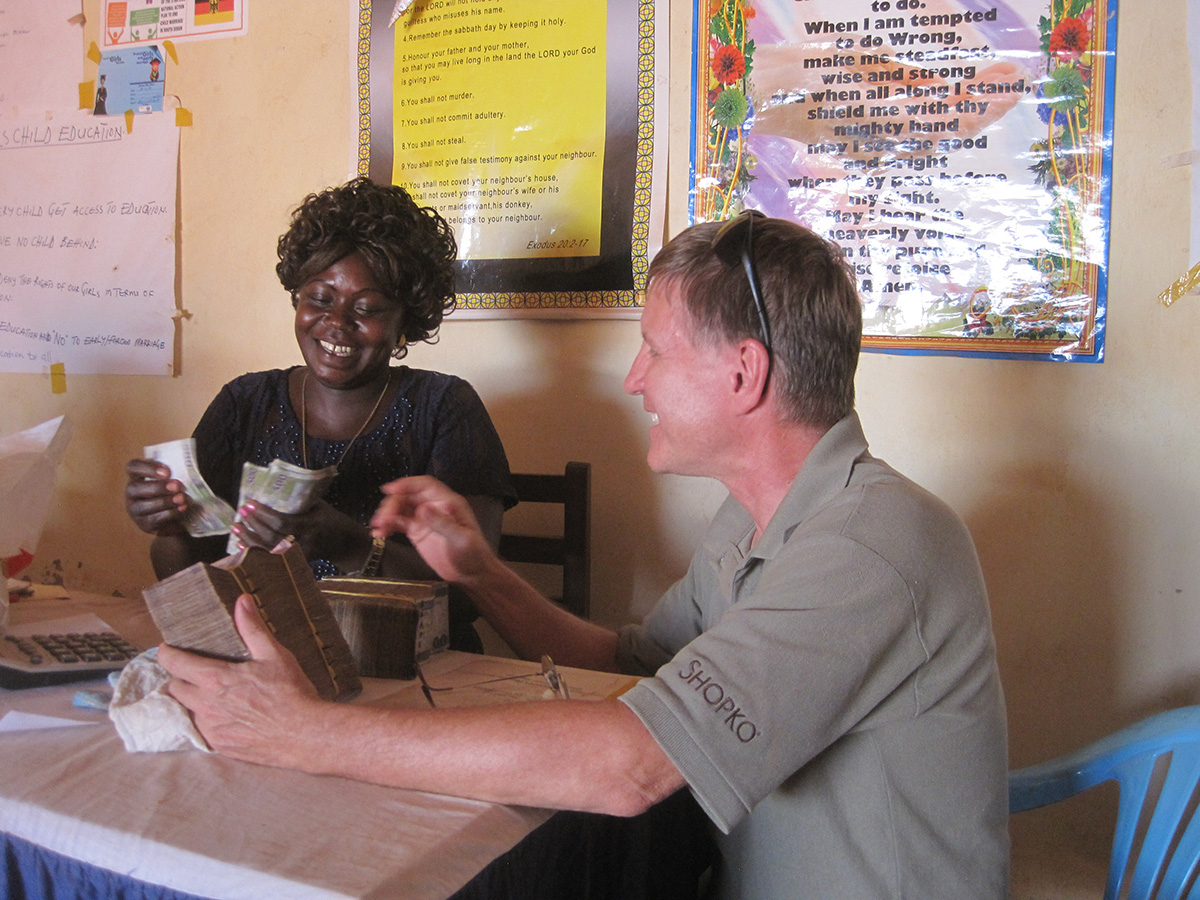
Emelia Yabang, counting money with Gabe Hurrish at the Anika store in Yambio, South Sudan. Photo courtesy of Gabe Hurrish.
Throughout most of the world, women live life at a disadvantage. It’s even tougher in Africa, and many women in South Sudan experience severe oppression. Several men here have told me that “a cow is more valuable than a woman.”
Most girls are not allowed to finish school; many are married off at the age of 13 or 14 to old men — being sold for cows or cash as their dowry. All too often their life is drudgery and abuse. During armed conflict, they are sometimes raped by combatants or used as slaves and concubines.
Many have been abandoned by men or are widows struggling to raise their children. Emelia Yabang, who I met two years ago in Yambio, is helping women facing these challenges.
Emelia impressed me with her cheerfulness and big smile when she came to our teachers’ college to sell trinkets such as dish soap, hand lotion, peanuts and baskets. I later found out she is the director of Anika (“We can do it” in the local Pazande language), a women’s group she started with no outside funding or assistance. The group helps women create small businesses, making and selling clothes and many other products.
The women also pray together; faith is a big part of why they do this work.
Emelia also helps mediate domestic issues between husbands and wives. When one of the women experiences domestic violence, the others will take her into their homes.
The group recently brought a court case against one man. In South Sudan, there are two systems of law — civil law, run by the government, and traditional law, administered by the chiefs and tribal courts. In domestic violence cases, the lawyer usually defers to the tribal court, and in 99.9% of the cases, the verdict is decided in the man’s favor. So even the fact that the women organized and united to bring this case was a shock to the men who run the law.
Now well-known in Yambio, Anika continues to grow. During the pandemic, the women helped with public information campaigns and produced hand soap and face masks.
Despite many hardships, women are the ones holding this country together. Women know what the problems are, but they often lack the power to solve them. Working together in groups like Anika, gives them strength.
This feature appears in the Spring 2021 issue of Voices of Compassion, the magazine of Maryknoll Lay Missioners.
To read a PDF copy of the magazine, click here.
You can find an archive of previous issues of Voices of Compassion magazine here.

